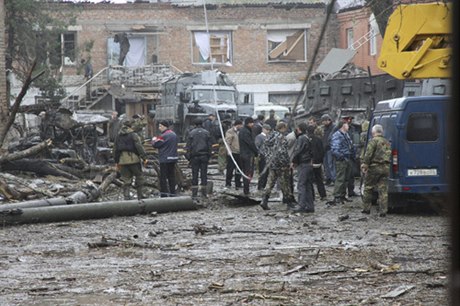Several reports in the Russian media indicate that the suspected terrorists arrested in Prague on April 6 were linked to al-Qaeda and part of a network for financing the Islamic insurgency in Russia’s North Caucasus region. The sources from the Russian special services cited also said that a Czech-registered human rights organization was instrumental in setting up the financial network.
The Czech daily Právo last week cited a report published by the Russian news server lifenews.ru that quoted sources in the Russian special services revealing fresh details about the arrests of eight people — six in Prague, two in Germany — suspected of providing financial and other support to the Islamist insurgency in Russia’s North Caucasus region.
“Two of the men were natives of the Republic of Dagestan, and one from Chechnya. They were the middle link in a financial chain that led to the accounts of representatives of al-Qaeda in the North Caucasus,” Lifenews.ru reported, citing a source in the Russian special services.
Lifenews.ru’s sources said the suspects arrested in Prague had distributed the money to cells of Jamaat Shariat, an organization founded in 2000 as part of the Caucasus Emirate declared by Chechen Islamist leader Doku Umarov in 2005, which seeks to establish an Islamic state under Sharia law encompassing the North Caucuses region.
In each cell there were one or more experienced instructors from Egypt, Palestine or Turkey, the report said. Jamaat Shariat, also known as the Dagestan Front, regularly targets police, security forces and Muslim clerics who cooperate with the authorities.
People in Need
Practically all the leading Czech media, including Czech Television (ČT) and the Czech Press Agency (ČTK) cited the article in Právo, which itself was based solely upon the report by Lifenews.ru — which is essentially a tabloid publication. However, Russia’s bestselling and pro-government daily Komsomolskaya Pravda also carried a similar report the same day.
Both reports by the Russian publications cited sources in special services as saying that those arrested had worked under the cover of a Czech NGO that had invited them to the Czech Republic. “It transpired that the criminals acted under the cover of one of the north Caucasian human rights organizations, whose founders were Czech citizens,” Komsomolskaya Pravda reported.
Czech Position contacted the author of the Komsomolskaya Pravda report, who confirmed that the human rights organization in question is People in Need (Člověk v tísní). Founded in 1992, the Czech NGO was active in Chechnya from 2000 until 2005, when it was expelled after Russian security services reported that weapons and false documents for the Chechen insurgency had been found in a center for women funded by the charity.
“As is well known, foreign human rights activists arrived in Chechnya, Dagestan and Ingushetia several years ago. Recently, their permanent presence in the region was reduced drastically, but a staff of local human rights activists remained and ‘supervisors’ continued to pay visits from Prague,” Komsomolskaya Pravda wrote.
Lifenews.ru carried an analogous claim: “[The suspects] operated under the cover of one of the North Caucasian human rights organizations whose founders were Czech citizens.”
Islamist leaders’ ‘liquidation’ a breakthrough
Both reports quoted security services source as saying that anti-terrorist operatives had long been trying to locate the source of funding for Jamaat Shariat and other Islamist groups in the region. The breakthrough came when Jamaat Shariat leader Isparil Validzhanov was killed by special forces in Dagestan (on April 18) and when the leader of the Islamist insurgency in the North Caucasus republic of Kabardino-Balkaria, Kazbek Tashuyev — who adopted the name Emir Abdul Dzhabbar — was “liquidated” in a special operation in the region (on April 29).
Czech Position asked the journalists who wrote the reports whether their sources had provided details of evidence found proving the alleged involvement of the Czech charity People in Need (PiN) in the channels of finance for the rebels.
“They said they had found evidence indicating the involvement of the [human rights] organization,” the author of the Lifenews.ru report said. “They did not mention specific documentary evidence.”
Both reporters refused to provide Czech Position with the contact details for their source(s) in the security services, which judging by the similarity of the reports, may be the same. Czech Position attempted to contact a spokesman for the Federal Security Service (FSB), but redirected calls were not answered.
PiN denies all allegations
PiN director Šimon Pánek told Czech Position that the NGO didn’t reopen a mission in Chechnya following the de facto expulsion in 2005, though the organization did provide support for local Chechen NGOs for several years after its departure. When still present in Chechnya, PiN cooperated with the Czech authorities on asylum issues. The Russian judiciary had effectively exonerated PiN of all the allegations raised against it in the mid 2000s, the NGO says.
“After 2000, we were one of the sources of expert information about the situation in Chechnya for asylum procedures in the Czech Republic, and we cooperated with the Interior Minister’s Commission for Refugees in this area,” Pánek told Czech Position. He also said that the Russian judiciary had effectively exonerated PiN of all the allegations raised against it in the mid 2000s.
“Following six years of work and [providing] enormous humanitarian aid in Chechnya amounting to Kč 400 million, namely with the support of the UN, in 2005 our registration in Russia was not prolonged as a result of a campaign to discredit our organization, including verbal attacks and completely unfounded accusations of supporting terrorism. None of the slurs were proven and the Russian Ministry of Justice renewed our registration in 2008,” Pánek said.
PiN was one of several NGOs expelled from Chechnya in the mid-2000s in what some observers claimed was a campaign by the Russian authorities to control the flow of information from the war-torn republic.
Human rights, Russian ‘annoyance’
Czech Position also asked Šimon Pánek whether PiN currently has any activities in other regions of Russia that may have annoyed the country’s authorities, and whether the fact that PiN receives funding from the Czech state and the US National Endowment for Democracy may cause official Russia to suspect that the NGO has a political agenda — factors that may have prompted the latest allegations from the security services. ‘The authorities in Russia react with annoyance to anything connected with the violation of human rights and with help to Russian NGOs.’
“It wouldn’t surprise me. The authorities in Russia react with annoyance to anything connected with the violation of human rights and with help to Russian NGOs to inform about what’s going on in Russia, or the direct distribution of such information. At the same time, I wouldn’t call what we do a political agenda: It’s a question of human rights which aren’t primarily political. For example, our activities include the organization and exhibition about murdered Russian journalists and civil activists, a series of films about the situation in Russia shown at the One World documentary film festival, support for visits, meetings and discussions with Russian human rights activists in Prague, Brussels etc.”
PiN is also one of the founders of the recently established EU-Russia Civil Society Forum.
Prague arrests
On May 3, the anti-organized crime unit of the Czech Police (ÚOOZ) announced the arrest on April 6 of eight suspected terrorists, two of them in Germany. The six arrested in Prague are set to be the first in Czech history to be charged under terrorism laws. According to ÚOOZ spokesman Pavel Hanták, police began surveillance of the suspects in 2008 following a tip off by colleagues in Germany.
The Russian embassy in Prague has confirmed that it has received the names of four Russian citizens arrested from the Czech authorities, but the official reason for their arrest was not stated, the embassy told the Russian news agency RBK.
The Russian daily Kommersant cited a representative of the Chechen diaspora in Prague, Salmirza Akhyadov, as saying that one of those arrested was called Shakhbi. “I met him sometimes in the local mosque. He didn’t raise any suspicions, other than perhaps praying more fervently than others,” Akhyadov told the daily.
Hanták declined to say whether or not the ÚOOZ had cooperated directly with Russian special services in the lead up to the arrest of the terror suspects, on the grounds that criminal investigation is ongoing. He did say, however, that the Interior Ministry’s international contact department receives information about potential terrorist activity from foreign counterparts.
The ÚOOZ spokesman said the investigation could be very lengthy and declined to predicti when the case may be handed to the public prosecution service.
On-going bloody insurgency
The Russian intelligence agency FSB concluded that former Jamaat Shariat leader Magomedal Vagarov, killed resisting arrest in August 2010, was the main organizer of the double suicide bombings in the Moscow metro in March 2010 in which 40 people were killed and over 100 injured. Mariam Sharipova, Vagarov’s wife and widow of former Jamaat Shariat leader Umalat Magomed (killed by special forces in December 2009), was one of the suicide bombers in the Moscow attacks.
According to the Russian special services over 60 attacks were carried out on police, interior ministry troops and special service forces in Dagestan between 2001 and 2007. More recently, Islamist militants have targeted infrastructure, primarily oil and gas installations.
Dagestan, the most populous of the Russian North Caucasian republics, has been the most restive in recent years since the culmination of the second war in neighboring Chechnya and the subsequent suppression of much of the Islamic insurgency there.




